Introduction
Here are some examples of exercises for you to try. The exercises may be suggested for a condition or for rehabilitation. Start each exercise slowly. Ease off the exercises if you start to have pain.
You will be told when to start these exercises and which ones will work best for you.
How to do the exercises
Shoulder flexion (lying down)
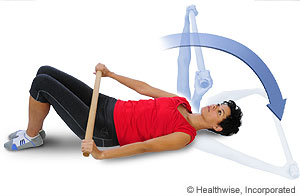
For this exercise, you will need a wand. To make a wand, use a piece of PVC pipe or a broom handle with the broom removed. Make the wand about a foot wider than your shoulders.
- Lie on your back, holding a wand with your hands. Your palms should face down as you hold the wand. Place your hands slightly wider than your shoulders.
- Keeping your elbows straight, slowly raise your arms over your head until you feel a stretch in your shoulders, upper back, and chest.
- Hold 15 to 30 seconds.
- Repeat 2 to 4 times.
Shoulder blade squeeze
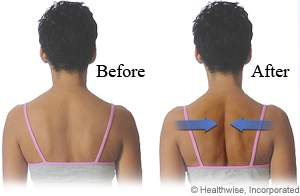
- While standing with your arms at your sides, squeeze your shoulder blades together. Do not raise your shoulders as you are squeezing.
- Hold for 6 seconds.
- Repeat 8 to 12 times.
Internal rotator strengthening exercise
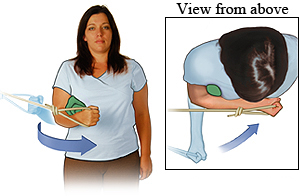
For this exercise, you will need elastic exercise material, such as surgical tubing or Thera-Band.
- Begin by tying a piece of elastic exercise material to a doorknob.
- Stand or sit with your shoulder relaxed and your elbow bent 90 degrees (like the angle of the letter "L"). Your upper arm should rest comfortably against your side. Squeeze a rolled towel between your elbow and your body for comfort and to help keep your arm at your side.
- Hold one end of the elastic band in the hand of the painful arm.
- Rotate your forearm toward your body until it touches your belly.
- Keep your elbow and upper arm firmly tucked against the towel roll or the side of your body during this movement.
- Repeat 8 to 12 times.
Isometric shoulder external rotation
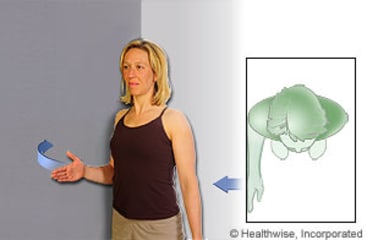
- Stand with your affected arm close to a wall.
- Bend your arm up so your elbow is at a 90 degree angle (like the letter "L"), and turn your palm as if you are about to shake someone's hand.
- Hold your forearm and elbow close to the wall. Press the back of your hand into the wall with moderate pressure.
- Hold for a count of 6.
- Repeat 8 to 12 times.
Shoulder abduction (isometric)
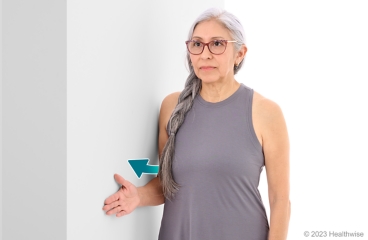
- Stand with your affected arm close to a wall.
- Bend your arm up so your elbow is at a 90-degree angle (like the letter "L"), and turn your palm as if you are about to shake someone's hand.
- Hold your forearm and elbow close to the wall. Press your elbow into the wall with moderate pressure.
- Hold for a count of 6.
- Repeat 8 to 12 times.
- It's a good idea to repeat these steps with your other arm.
Wall push-ups
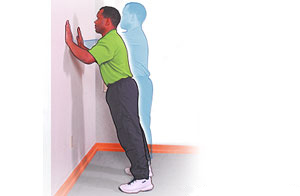
- Stand against a wall with your feet about 12 to 24 inches away from the wall. If you feel any pain when you do this exercise, stand closer to the wall.
- Place your hands on the wall slightly wider apart than your shoulders, and lean forward.
- Gently lean your body toward the wall. Then push back to your starting position. Keep the motion smooth and controlled.
- Repeat 8 to 12 times.
Current as of: July 24, 2025
Author: Ignite Healthwise, LLC Staff
Clinical Review Board
All Ignite Healthwise, LLC education is reviewed by a team that includes physicians, nurses, advanced practitioners, registered dieticians, and other healthcare professionals.

